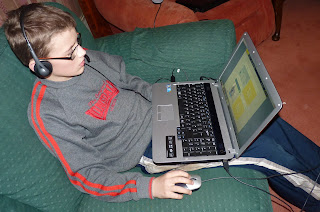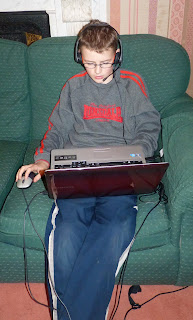Cross posted from my blog
I was going to call this "Economical home education" but education isn't cheap and probably shouldn't be. Before I upset everyone, just think, the main cost for most organisations including schools is the salary bill. Most home educators have given up all or most of one salary for the children's education. It is easy to say that the large figures suggested as the cost of bringing up children don't apply but once the loss of income is factored in, home education isn't cheap.
Then there is the cost of those lovely parcels of new books. I love getting new books, looking through them and working out exactly how we will use them.
Is it possible to make savings? Well, of course, and here are a few of my thoughts on the subject. Do remember that I am only two years into home ed. We believe that the children's education is important and is a higher priority than holidays or meals out. Yes, we do have both (thank you Tesco vouchers for the meals out!) but if anything has to go then these go well before education and there has been a year when that happened.
How to avoid over spending on home education.
-look before you leap.
Many publishers have free chapters on line. We have used these on more than one occasion before buying. This is particularly helpful if it is difficult to see a physical copy of the book.
Ask a friend if you can see their copy.
E-mail friends abroad who may have seen the book. This saved me an expensive mistake on a curriculum that I would have had to buy from abroad.
Read reviews.
-Buy second hand. This works better for some books than others. Great for the Latin book that is also used in schools. Not so good for the really popular science book which isn't published in the UK. Beware of old editions of science books-the information may be incorrect. Fine if you are sure of your ground on the number of planets or the genome project but a problem for most of us.
-Teachers' books. This is a difficult one. It isn't always clear whether a teachers' book is just an answer book or whether it has more information.
I couldn't manage without the Latin teachers' guide with its comments on how to introduce a subject, common mistakes and ideas for further activities.
What I thought was an English teachers' guide turned out to be an expensive answer to comprehension questions.
I currently don't use maths teachers' books but enjoy maths and think it is a useful exercise to work out the answers myself. If I didn't like maths it would be different but again a proper teachers' book is more useful than a mere answer book.
-Use good but inexpensive resources. "Mothers' Companion" could be used alone up to age about 9-10. I don't use this alone but it is a great resource. I hope to review this properly at a later point.
I haven't used Ambleside on line but this is free.
Don't forget the library.
Friday, 18 March 2011
Monday, 14 March 2011
Unscheduled learning
Much though we tend to stick to timetables and schedules, that doesn't mean that the children don't learn outside of "school" hours.
Several months ago, Alex (who is now working and no longer home schoooled) bought Rosetta Stone French Level I.
He didn't use it much, it lay dormant in a locker somewhere . . . . .
Then a couple of weeks ago, JoE (12) found it, during his "free time" (that is time which is not lesson/school time, nor chore time) and became enthralled with it. JoE has progressed through much of it, and is quite quite fascinated, he chooses to spend time learning rather than playing.
So much so that one or two of his siblings have wanted to join in, so to avoid discord, I've just purchased Rosetta Stone Level I Latin American Spanish.
I am able to help with French, since I studied it at University; Spanish however, is completely beyond me; and another child wants to spend their free time learning Arabic (utterly outwith my comfort zone!) (They've even asked for Rosetta Stone Arabic for their birthday!)
There is a six month money back guarantee with Rosetta Stone and (no advertising intended, grin) if you get the home school pack you can install up five users on each of two PCs - suits us.
I've not scheduled Rosetta Stone into their learning, it is completely something they want to do, so that they can do it. . . . autonomous learning.
I had to take some pics today - JoE with his French. It has a headphone set and you can't pass each level till you can recognise speech, and - much harder for us,given that the dc have a cross between Lewisian Scottish/BBC English / American accents - they have to also pronounce the words correctly.
When he is really fed up he comes to me for help - by my accent is not much of a help at all! (I can do the grammar etc ok)
Monday, 7 March 2011
To schedule or not to schedule.. . .
It's been a long time since I've posted on here - sorry. Real life tends to get in the way of blogging sometimes.
I thought I'd respond to Sharon's post on creating a learning environment/relaxed home education, as distinct from setting a timetable and being very scheduled. I do think that most parents (at least in the UK where home ed is about 20 yrs behind the US in many ways) tend to begin their home ed journey being quite scheduled/timetabled/organised, and then move to being less so. Esp when parents take their children out of school, and feel the need to replicate school at home.
Recent group work - a huge advantage of having children close in age is that they can work on projects together.
I thought I'd respond to Sharon's post on creating a learning environment/relaxed home education, as distinct from setting a timetable and being very scheduled. I do think that most parents (at least in the UK where home ed is about 20 yrs behind the US in many ways) tend to begin their home ed journey being quite scheduled/timetabled/organised, and then move to being less so. Esp when parents take their children out of school, and feel the need to replicate school at home.
(Not all our learning is formal or scheduled, there is always time at weekends for Dad's input)
I also do feel that unschooling or child led schooling is much harder (in most ways!) than having a timetable and knowing what has to be done and when. Or to be fair, it wouldn't work easily in a family like ours, where I am a full time wife and housewife, with my husband out of the house 12 - 14 hrs a day, and no outside help; and was blessed with 12 children in less than 13 yrs.
I simply could not have coped without my trusty timetable/schedule, making sure that at least the basics got done with each child, when I was pregnant and very sick.
I did used to have a very complex schedule (I think you might have seen it once, Sarah, it was up on the wall when you came round!) detailing what each child should be doing every hour of the day from getting up till going to bed.
That worked/was necessary for us at that point in time (and we didn't always keep to it anyway), but it was a useful tool at the time.
What is important is that we work with and for our children / families, in whatever situation we are in. No two home educating families will ever be the same, or do the same things, use the same materials, etc.
I love the ability to personalise my children's education. But I also sometimes rely (and in the past more heavily) on simple routines and materials. A schedule is a great servant, but it can be a bad master.
Years ago (c 1998; when I had seven children under 8) I remember Alexander asking me about Alfred the Great and I was about to reply "that can wait until it is time for History" - and then I thought to myself, "don't be ridiculous, he's genuinely interested, tell him about it for ten minutes" (And then I had to get back on schedule and do reading or whatever with Constance, Rupert, check that Lucy was playing happily with JJ, and that JP and JE were still napping)
Life was busy then. It is busy now, but in each situation God has blessed and helped us. May we all find the best way to bring up our families for God's glory and their good.
Subscribe to:
Comments (Atom)



